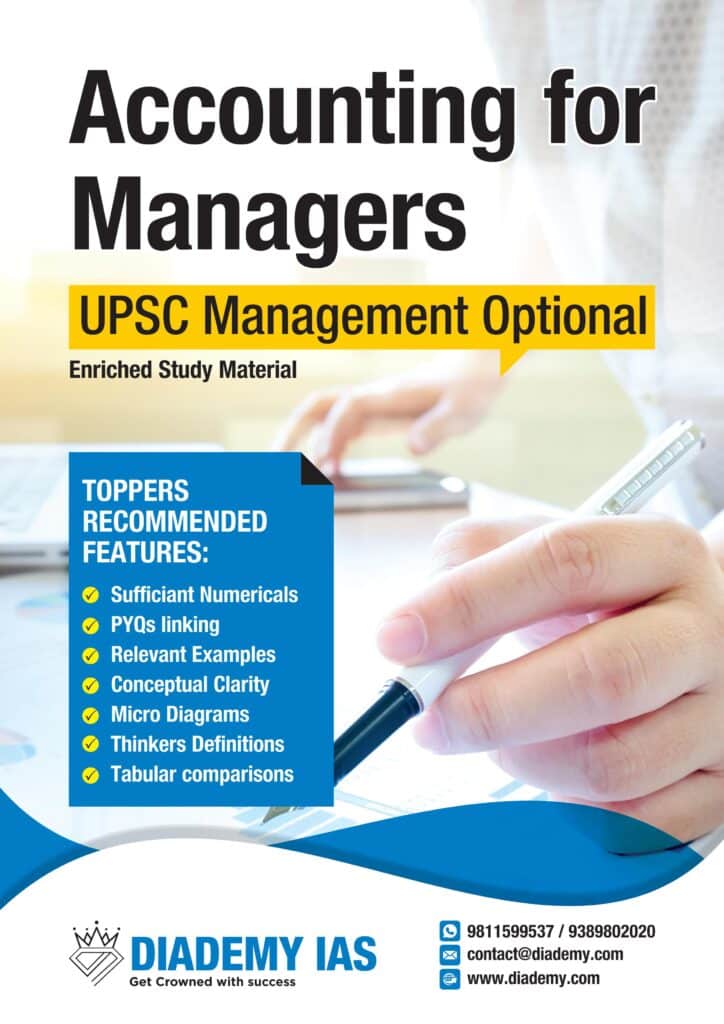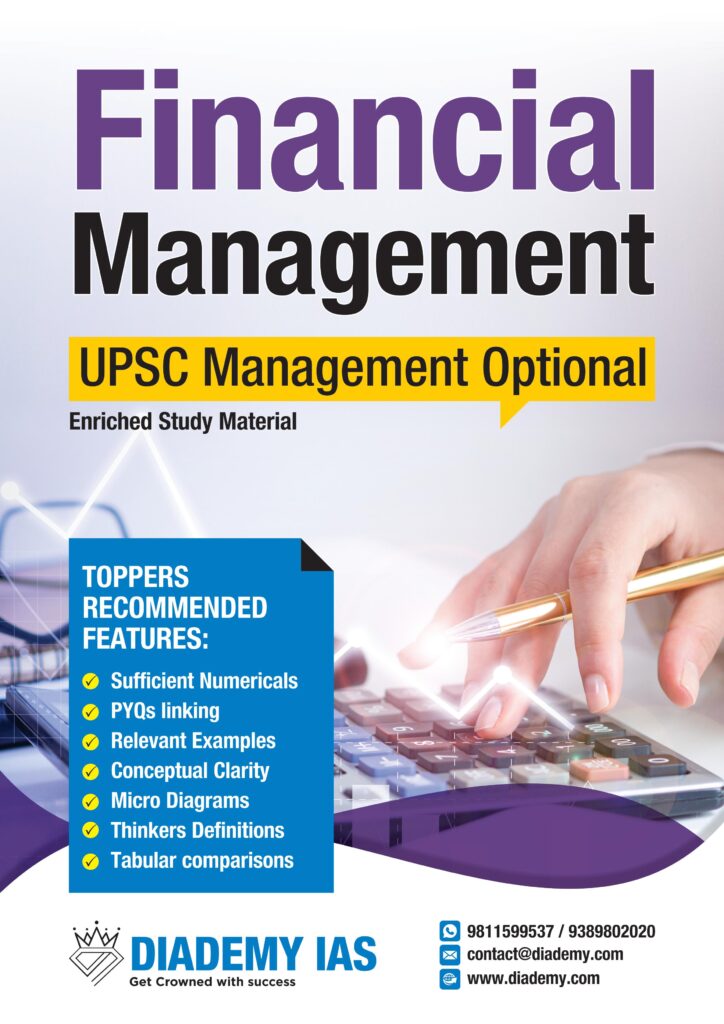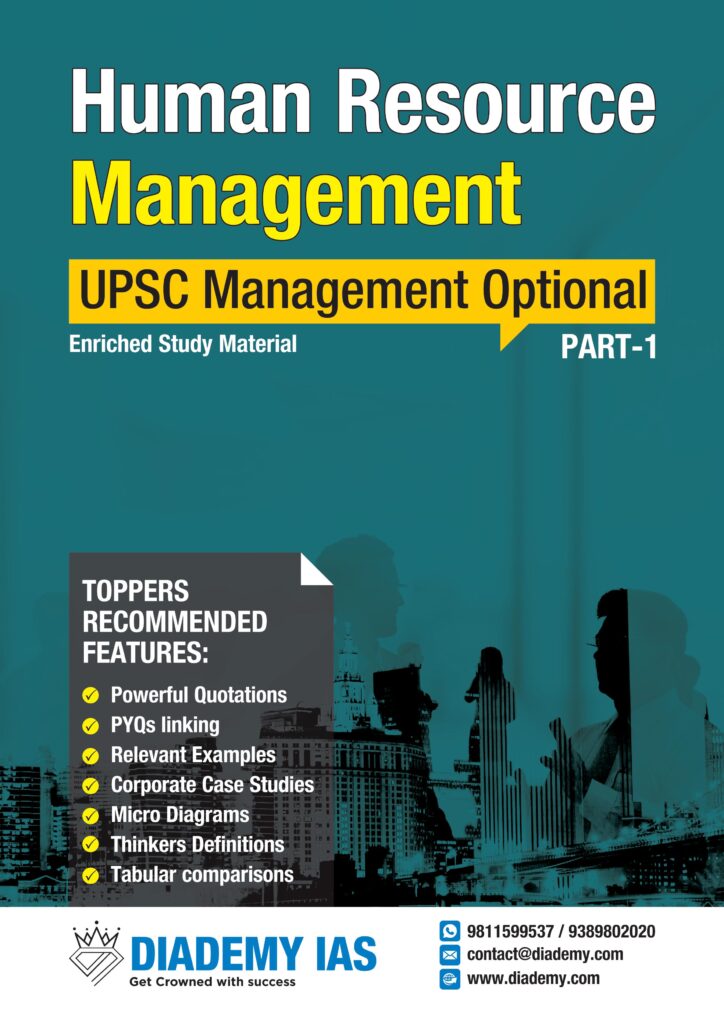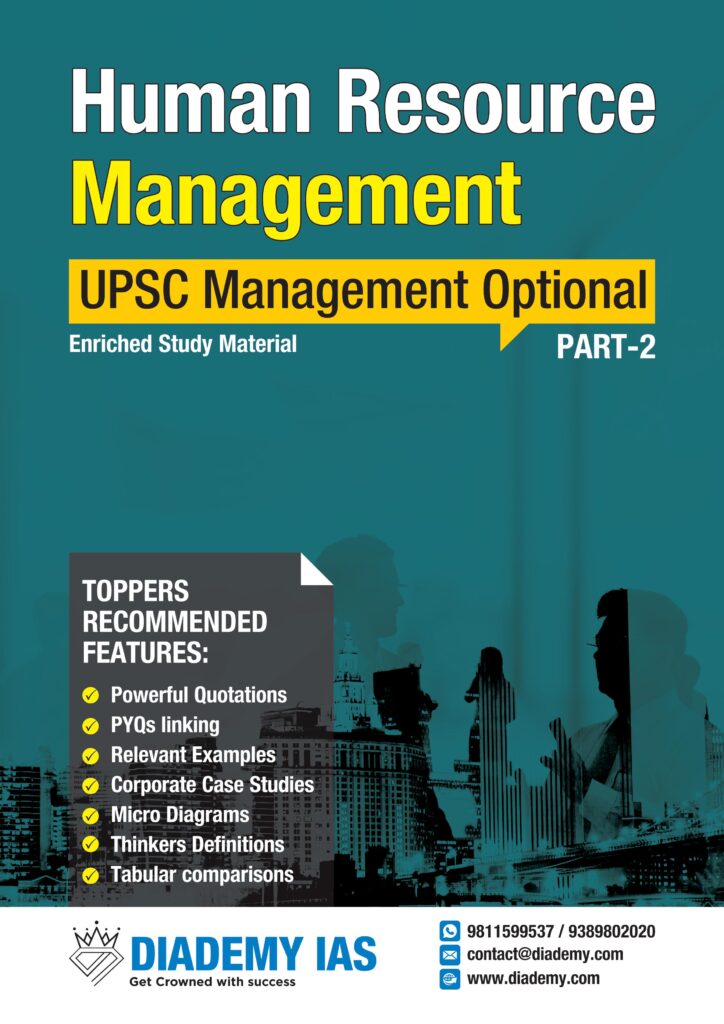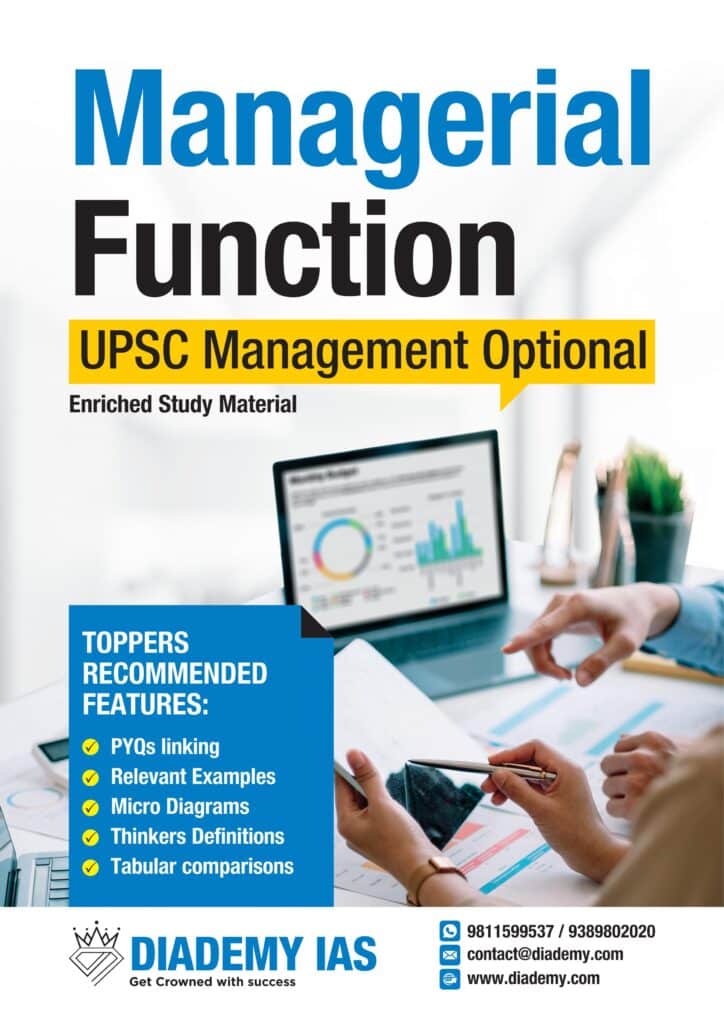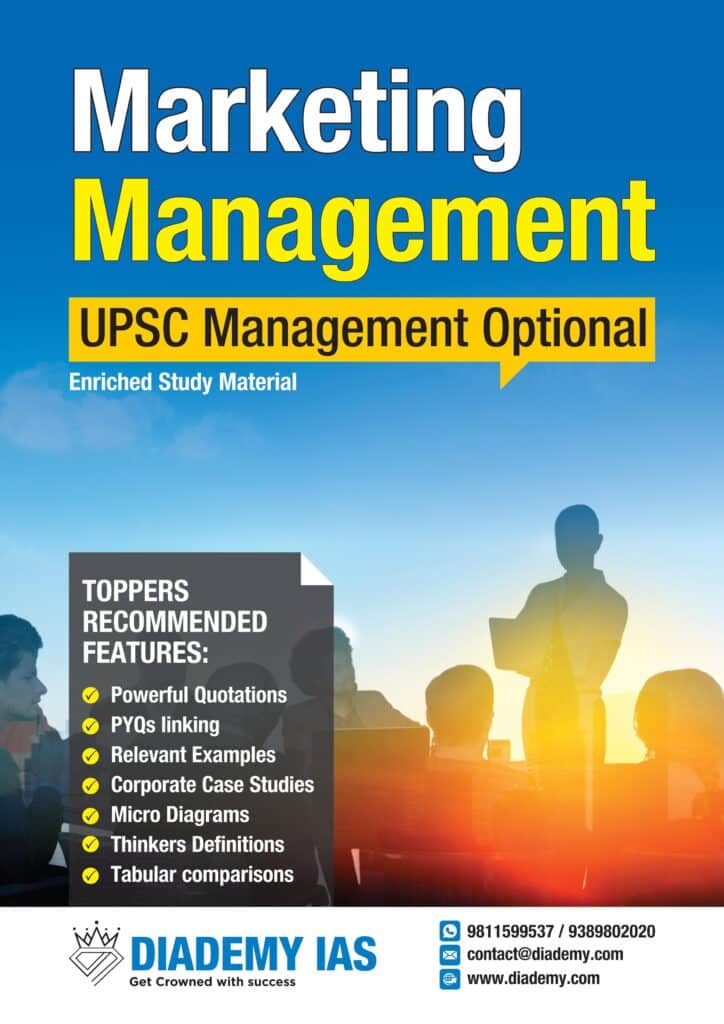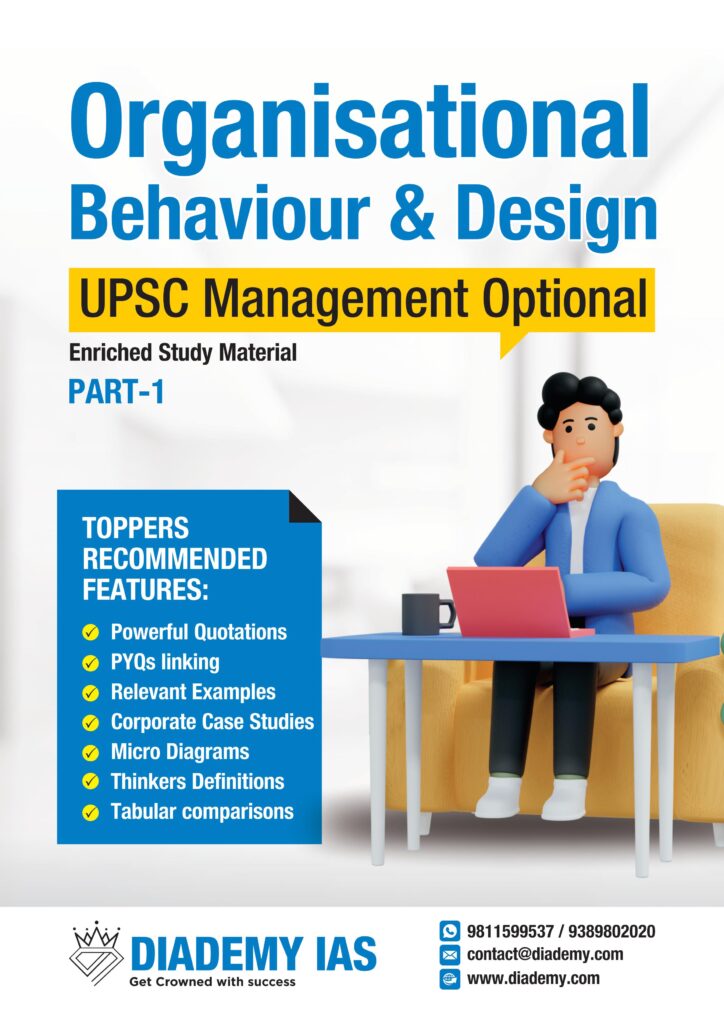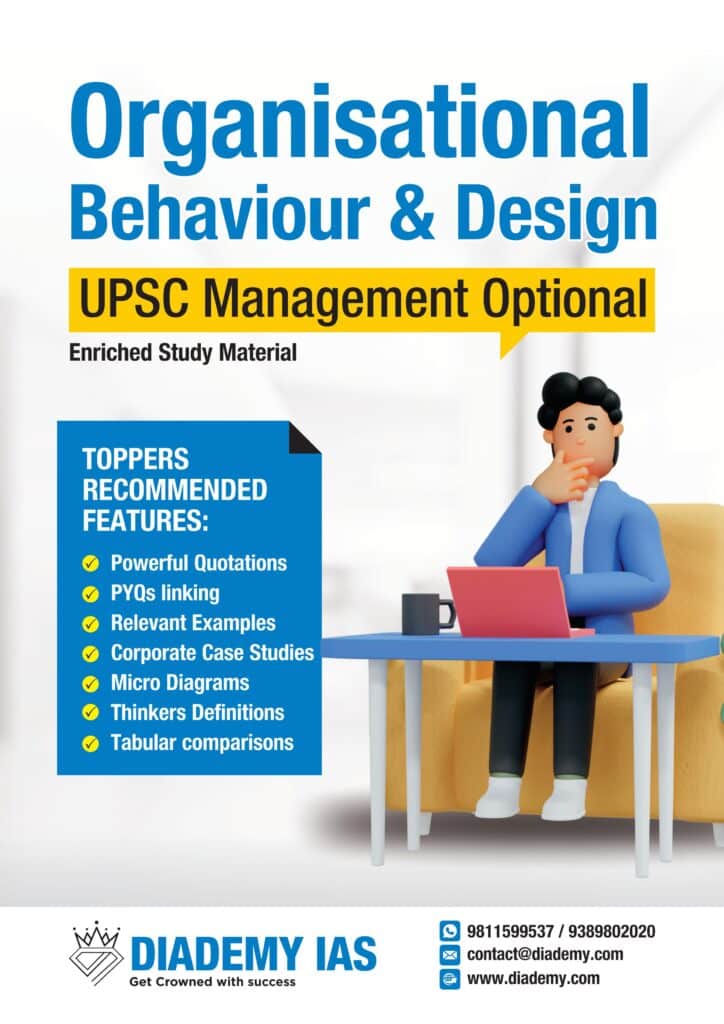Management Optional for UPS
Ace Your Management Optional Preparation
Course Duration: 4 Month
Management Optional UPSC Course
The UPSC Management Optional Course is designed to equip students with the knowledge and skills they need to excel in their UPSC exams. This course provides a comprehensive overview of management theory and practice, covering topics such as business strategy, organizational behavior, human resources, marketing, finance and accounting. It also includes modules on leadership and communication skills. Through this course, students will gain a better understanding of the various aspects of management and be able to apply them in their UPSC exams.
Management Optional Courses
UPSC Management Optional Course Features
Classroom Foundation Course Features:
Program duration: 6 Months
- 5-6 Classes a week
- Each Classes of 2-2.5 hours of duration
Features of Management Optional Classroom Foundation Course:
- Hardcopy Paperback Study Materials (CHECK MATERIAL SAMPES HERE)
- No need to approach for any other materials
- 21 Weeks of Daily Answer Writing (CHECK TESTS SAMPLES HERE)
- 8 Sectional Tests (4 From Each Paper)
- 4 Full Length Tests (2 From Each Paper)
- Timely Evaluation of Answers written
- Weekly dedicated Mentorship Session
- PYQ Solutions
- Revision Short Notes
- Live + Recording
Offline (Delhi) & Online
Enriched Study Material Course Feature:
Enriched Study Material Paper 1 & 2 : Management Optional UPSC
Features –
- 100% Syllabus covered
- Based on books recommended by UPSC Toppers
- Lucid language
- Coverage based on UPSC PYQ Pattern
Integrates the value additions recommended by MANAGEMENT OPTIONAL TOPPERS:
1. PYQs Years Marking
2. Powerful Quotations
3. Relevant Examples
4. Corporate Case Studies
5. Micro Diagrams
6. Thinkers Definitions
Mentorship cum Test Series Course Feature:
3 Phased Management Optional Mentorship cum Test Series Program:
Fresh Batch Starts on coming Monday
Program duration: 6 to 9 Months (mean
Phase 1: Daily Answers (21 weeks)
Phase 2: Subject-wise tests (2 Months)
Phase 3: Full-length Mock tests (1 Month)
Program Validity: Mains 2023 or Mains 2024 as per your need
Features:
1. Daily schedule with micro topics target
2. Customized targets based on the individual status of preparation.
3. PYQs covered fully
4. Weekly Mentorship calls
5. Personal tracking sheet
6. Target 3 months for each paper
7. Exam-oriented UPSC pattern questions
8. Flexibility to write Answers as per your timings
9. Online plus offline (Delhi & Kolkata)
About Your Coach

Zeba Rehman
- Senior UPSC faculty for GS Economy & Accounting, Labour laws, etc
- Authored 15+ Books on UPSC EPFO/APFC & Civil services exams
- Mentored over 100 UPSC toppers through a strategic approach
- Appeared 3 times in UPSC Interviews
- 10+ Years Coaching Experience
- 8+ Years of Government work experience
CA Rahul Kumar’s experience of mentoring UPSC students and appearance in UPSC interviews 3 times make him an ideal mentor to crack the EPFO/APFC exam. As a chartered accountant, his in-depth knowledge of subjects like accounting, industrial relations, labor law, and more subjects gives him an edge over other competitors in the market today. His lucid yet comprehensive way of teaching is very much liked by students.
In UPSC CSE, AIR 43, 111, and 95+ more toppers who secured IAS/IPS/IFS/IRS jobs were mentored by him, which is a testament to his expertise and success rate. He has authored 15+ books on Commerce & Management subjects related to UPSC IAS & regulatory exams like RBI, SEBI, NABARD, APFC, EPFO, etc, which are widely acclaimed by students and experts in the field.
Currently, he is a senior faculty for UPSC EPFO, APFC & IAS exams & Academic Director at DIADEMY IAS located at the Hub of IAS preparation i.e, Old Rajinder Nagar, Delhi.
Commerce Optional Syllabus
Commerce and accountancy optional syllabus for Paper-1 | |
1.1 | Accounting as a Financial Information System; Impact of Behavioural Sciences. Accounting Standards e.g., Accounting for Depreciation, Inventories, Research and Development Costs, Long-term Construction Contracts, Revenue Recognition, Fixed Assets, Contingencies, Foreign Exchange Transactions, Investments and Government Grants, Cash Flow Statement, Earnings Per Share |
1.2 | Accounting for Share Capital Transactions including Bonus Shares, Right Shares, Employees Stock Option and Buy-Back of Securities. |
1.3 | Preparation and Presentation of Company Final Accounts. Amalgamation, Absorption, and Reconstruction of Companies. |
2.1 | Cost Accounting: Nature and Functions of Cost Accounting. Installation of Cost Accounting System. Cost Concepts related to Income Measurement, Profit Planning, Cost Control and Decision Making. |
2.2 | Methods of Costing: Job Costing, Process Costing, Activity Based Costing. Volume – cost – Profit Relationship as a tool of Profit Planning. |
2.3 | Incremental Analysis/ Differential Costing as a Tool of Pricing Decisions, Product Decisions, Make or Buy Decisions, Shut-Down Decisions, etc. |
2.4 | Techniques of Cost Control and Cost Reduction: Budgeting as a Tool of Planning and Control. Standard Costing and Variance Analysis. |
2.5 | Responsibility Accounting and Divisional Performance Measurement. |
3.1 | Taxation Income Tax: Definitions; Basis of Charge; Incomes which do not form Part of Total Income. Simple problems of Computation of Income (of Individuals only) under Various Heads, i.e., Salaries, Income from House Property, Profits and Gains from Business or Profession, Capital Gains, Income from other sources, Income of other Persons included in Assessee’s Total Income. |
3.2 | Set – Off and Carry Forward of Loss. |
3.3 | Deductions from Gross Total Income. Salient Features/Provisions Related to VAT and Services Tax. |
4.1 | Auditing: Company Audit: Audit related to Divisible Profits, Dividends, Special investigations, Tax audit. |
4.2 | Audit of Banking, Insurance, Non-Profit Organizations and Charitable |
4.3 | Societies/Trusts/Organizations. |
5.1 | Financial Management: Finance Function: Nature, Scope, and Objectives of Financial Management: Risk and Return Relationship. Tools of Financial Analysis: Ratio Analysis, Funds-Flow, and Cash-Flow Statement. |
5.2 | Capital Budgeting Decisions: Process, Procedures and Appraisal Methods. Risk and Uncertainty Analysis and Methods. |
5.3 | Cost of capital: Concept, Computation of Specific Costs and Weighted Average Cost of Capital. CAPM as a Tool of Determining Cost of Equity Capital. |
5.4 | Financing Decisions: Theories of Capital Structure – Net Income (NI) Approach, Net Operating Income (NOI) Approach, MM Approach and Traditional Approach. Designing of Capital structure: Types of Leverages (Operating, Financial and Combined), EBIT- EPS Analysis, and other Factors. |
5.5 | Dividend Decisions and Valuation of Firm: Walter’s Model, MM Thesis, Gordan’s Model Lintner’s Model. Factors Affecting Dividend Policy. |
5.6 | Working Capital Management: Planning of Working Capital. Determinants of Working Capital. Components of Working Capital Cash, Inventory and Receivables. |
5.7 | Corporate Restructuring with focus on Mergers and Acquisitions (Financial aspects only). |
6.1 | Financial Markets and Institutions: Indian Financial System: An Overview Money Markets: Participants, Structure and Instruments. Commercial Banks. Reforms in Banking sector. Monetary and Credit Policy of RBI. RBI as a Regulator. |
6.2 | Capital Market: Primary and Secondary Market. Financial Market Instruments and Innovative Debt Instruments; SEBI as a Regulator. |
6.3 | Financial Services: Mutual Funds, Venture Capital, Credit Rating Agencies, Insurance and IRDA. |
Commerce and Accountancy Optional Syllabus for Paper-II | |
1.1 | Organisation Theory: Nature and Concept of Organisation; External Environment of Organizations -Technological, Social, Political, Economical and Legal; Organizational Goals – Primary and Secondary goals, Single and Multiple Goals; Management by Objectives. |
1.2 | Evolution of Organisation Theory: Classical, Neo-classical and Systems Approach. |
1.3 | Modern Concepts of Organisation Theory: Organisational Design, Organisational Structure and Organisational Culture. |
1.4 | Organisational Design–Basic Challenges; Differentiation and Integration Process; Centralization and Decentralization Process; Standardization / Formalization and Mutual Adjustment. Coordinating Formal and Informal Organizations. Mechanistic and Organic Structures. |
1.5 | Designing Organizational structures–Authority and Control; Line and Staff Functions, Specialization and Coordination. |
1.6 | Types of Organization Structure –Functional. Matrix Structure, Project Structure. Nature and Basis of Power, Sources of Power, Power Structure and Politics. Impact of Information Technology on Organizational Design and Structure. |
1.7 | Managing Organizational Culture. |
2.1 | Organisation Behaviour: Meaning and Concept; Individual in organizations: Personality, Theories, and Determinants; Perception – Meaning and Process. |
2.2 | Motivation: Concepts, Theories and Applications. Leadership-Theories and Styles. Quality of Work Life (QWL): Meaning and its impact on Performance, Ways of its Enhancement. Quality Circles (QC) – Meaning and their Importance. Management of Conflicts in Organizations. Transactional Analysis, Organizational Effectiveness, Management of Change |
3. | Human Resources Management (HRM) : Meaning, Nature and Scope of HRM, Human Resource Planning, Job Analysis, Job Description, Job Specification, Recruitment Process, Selection Process, Orientation and Placement, Training and Development Process, Performance Appraisal and 360° Feed Back, Salary and Wage Administration, Job Evaluation, Employee Welfare, Promotions, Transfers and Separations. |
4.1 | Industrial Relations (IR): Meaning, Nature, Importance and Scope of IR, Formation of Trade Unions, Trade Union Legislation, Trade Union Movement in India. Recognition of Trade Unions, Problems of Trade Unions in India. Impact of Liberalization on Trade Union Movement. |
4.2 | Nature of Industrial Disputes: Strikes and Lockouts, Causes of Disputes, Prevention and Settlement of Disputes. |
4.3 | Worker’s Participation in Management: Philosophy, Rationale, Present Day Status and Future Prospects. Adjudication and Collective Bargaining. |
4.4 | Industrial Relations in Public Enterprises, Absenteeism and Labour Turnover in Indian Industries and their Causes and Remedies. |
4.5 | ILO and its Functions |
